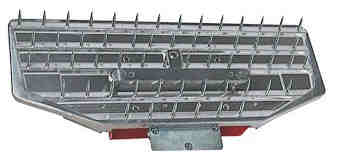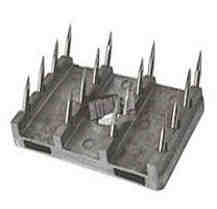Free Unbiased Carpet and Flooring Information
Carpet Padding - Do I Need a Moisture Barrier Pad?
What is a Moisture Barrier Pad?
Moisture Barrier padding is a special carpet padding with a thin layer of plastic on the top to help prevent liquids from soaking through the carpet backing and into the padding and to the subfloor.
One pad manufacturer says "A moisture barrier helps prevent spills and accidents from penetrating the cushion, so wetness can be blotted up from the carpet quickly and easily." However this statement does not make any sense to me. Once a spill goes through the carpet backing and rests on the top of the padding it cannot be blotted up, it's under the carpet! You can blot up any wetness soaked into the carpet fibers, but you can't blot up any moisture that is under the carpet. It is unreachable.
It's possible to vacuum up some of the soaked-in liquids if you have a carpet cleaning machine with a hand-held attachment. Residential carpet vacuums are not designed to suck up liquids, so please don't try this.
Is Moisture-Barrier Padding Really Necessary? Some carpet salespeople recommend a Moisture Barrier Padding or some other type of padding upgrade to almost every customer. Why? One reason is to make more money. Maybe they actually think a moisture barrier padding has some merits for every application.
Moisture Barrier Padding is a lot more costly than a standard Rebond type padding. Upgrading to any specialty padding, including pad with a moisture barrier, can cost you plenty. If you upgrade from a standard 6-pound density Rebond pad to an 8-pound density moisture barrier pad, it can easily double your padding cost.
Do you really need to upgrade your padding? For most homeowners I would say no. However, I find that many homeowners are easily mislead into thinking that a Moisture Barrier Padding can solve some of their problems or concerns. Here's what I mean...
The brochure says a Moisture-Barrier Pad will prevent spills from soaking through the pad.
If this is true, what benefit does it provide? Any amount of liquid that is spilled and soaks through the carpet will quickly spread out on top of a moisture barrier pad. Some say that if the padding seams are sealed with duct tape, that liquids will not be able to soak through to the subfloor below.
Moisture Barrier Padding is Not Waterproof
Have you ever seen the sharp teeth on a carpet knee-kicker? It's the tool used to help stretch in the carpet. What do you think these 16 razor sharp spikes will do to that thin layer of plastic on the top of your costly Moisture Barrier Pad?
 Then
there is the carpet power-stretcher, this is a tool required to properly install
every stretch-in carpet over pad. Take a look at these teeth. There's over 50 long
sharp teeth that can easily go right through the carpet backing and put plenty of
holes in your moisture barrier pad.
Then
there is the carpet power-stretcher, this is a tool required to properly install
every stretch-in carpet over pad. Take a look at these teeth. There's over 50 long
sharp teeth that can easily go right through the carpet backing and put plenty of
holes in your moisture barrier pad.
So knowing this, it's quite obvious that any liquid spilled on the carpet can easily find a way through and underneath any Moisture Barrier Pad.
Carpet Steam-Cleaning Limitations
When you have your carpets steam cleaned, their steam cleaning equipment can't reach and clean old spills that may have soaked through the carpet backing and through to the padding and flooring below.
 The
job of a carpet cleaning professional is limited to cleaning the carpet surface fibers. They are trained to never
try to clean too deep or go below the carpet backing, it can damage your carpet
and padding.
The
job of a carpet cleaning professional is limited to cleaning the carpet surface fibers. They are trained to never
try to clean too deep or go below the carpet backing, it can damage your carpet
and padding.
Carpet cleaning professionals are trained to never soak your carpet. If a carpet cleaning person were to soak your carpet through the carpet backing and into your carpet padding, your carpet would take way too long to dry. Too much moisture could cause permanent damage to your carpet backing, cause wrinkles and waves to form, and even create a perfect habitat for mold and mildew to grow under your carpet and underneath your padding.
1. Moisture Barrier Padding In Basements
Some homeowners have a serious moisture problem in their basement and might think that a Moisture Barrier Padding will be beneficial by preventing moisture from coming up through the pad and carpet.
Unfortunately, because concrete is porous it can allow moisture to evaporate upward. A moisture barrier pad can trap moisture under the pad and can promote the growth of mold and mildew, potentially causing a hidden health hazard.
In basements, it is better to use a padding that can breathe. That way, if any moisture is under the pad it can evaporate up any away and lessen the chance for mold and mildew to develop.
2. Moisture Barrier Padding For Pet Urine Accidents
Some homeowners think that a moisture barrier pad will help with pet urine problems, perhaps making it easier to clean up the accident and reduce urine odors. This is not true because any liquid that soaks through the carpet backing will spread out on top surface of the moisture barrier padding.
While the entrance spot you see on top of the carpet may appear to be just 2 inches in diameter, under the carpet it could easily spread out to be 8 to 12 inches in diameter or more laying on the top surface of the moisture barrier padding.
Carpet cleaning equipment is not designed to suck up spills that soak through the carpet backing.
Liquids that soak through the carpet backing will spread out and dry on the surface of a moisture barrier padding. This makes the pet accident or spill much more difficult to clean up since the size and scope of the accident can be misleading.
Once pet urine dries on top of the padding, the odor will become more evident as foot traffic and regular vacuuming will continue to disturb and reactivate the affected area.
Every time you steam clean your carpets, the steam can "reactivate" any dried urine on top of the pad. Since some pets tend to have accidents in the same spot over and over again the problem becomes magnified and compounded. This is why I see no benefit in using a moisture barrier pad, for homeowners seeking to alleviate a pet urine problem.
3. Moisture Barrier Pad Over Hardwood Floors
Homeowners often install carpet and pad over beautiful hardwood floors. Some folks think that using a moisture barrier pad will help protect their beautiful hardwood floors from being ruined from any potential liquid spills.
Prolonged exposure to moisture can cause serious damage to hardwood floors. Potted plants and pet accidents are the moist common cause of damage to hardwood floors when a moisture barrier pad is used.
Some say that if the padding seams are sealed with duct tape, that liquids will not be able to soak through. If any spills fall near a compromised pad seams or near the outer edge, any spill will get underneath the pad and become trapped underneath. If not able to evaporate quickly, damage to the hardwood floors could be substantial over time.
From all my experience in the flooring business I've learned one thing for sure; that water (or any spill) will somehow find a way to soak through any moisture barrier and can cause significant damage, especially if trapped without any way to evaporate off.
For homes with hardwood floors, using a pad without a moisture barrier would be my suggestion. Most minor liquid spills would be able to evaporate and dry within a short period of time before causing serious damage to the hardwoods below.
Some say you could lay down plastic over the hardwoods and then put the pad over the plastic. Not really a great idea because you would probably hear the crunching of the plastic with every footstep. The pad would slip around too.
Beyond The Moisture Barrier Pad...
In the end, some folks spend a significant amount of money on specialty pads hoping for the best and end up not getting the results or benefits they expect. I don't generally recommend using any specialty pads because overall I think they are overpriced, have limited benefits and may cause more problems then they solve.
Some carpet manufacturers offer a warranty extension if you buy their specialty padding. Most homeowners never file a carpet warranty claim so if you consider the increased price of the pad against the limited benefits from an extended carpet warranty you might find that it is not worth the added expense.
I don't recommend buying any padding that will increase your new carpet warranty limits unless you have money to burn. Any good quality Rebond type padding with sufficient density (minimum 6 to 8 pound density) can likely do the job just fine and save you money.
Selecting the right carpet, choosing the right pad, getting qualified installation and buying from a reputable dealer are the four most critical factors in buying new carpet. Read through my website for more information and insight about how to buy new carpet wisely! Sitemap
If you suspect you have a water leak or moisture problem in your basement you need to fix the problem before you install any flooring product. There are many simple ways for you to test your concrete basement for moisture problems. I suggest you research this further to make sure your basement does not have any moisture problems before you install any flooring products.
Learn more:


